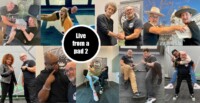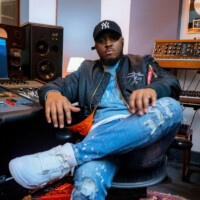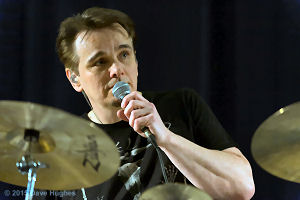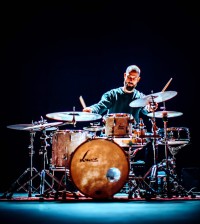 Like many others Eric Harland has played the drums since he was a little kid. Very unlike many others he got a full scholarship at a New York music college at the age of 16 – thanks to Wynton Marsalis himself. The rest is history.
Like many others Eric Harland has played the drums since he was a little kid. Very unlike many others he got a full scholarship at a New York music college at the age of 16 – thanks to Wynton Marsalis himself. The rest is history.
Today, Eric Harland is one of the most in demand jazz drummers in the world, recording and gigging with the who’s who of the scene. I met up with Eric before a show at the London Jazz Festival to talk about his path.
As a little kid you started off playing the piano. I read that you changed to drums because your mum always corrected you when you played piano?
Yes, I was about four years old and my mum taught me the piano. I had an amazing mum, very disciplinary, that’s just the way she taught and I know her main goal was just for me to be the best. But at that time I just wanted to experience the instrument. I didn’t wanna have to play exactly what teachers wanted me to play, I wanted the freedom to explore. So the reason I changed from piano to drums was that my mum didn’t know anything about drums.
I started taking drum lesson when I was about six years old. My drum teacher was perfect, he had a very buddhist approach. His name was Craig Green. He taught loads of great drummers from Houston like Chris Dave, Kendrick Scott, Mark Simmons, the list goes on. His whole approach was to observe your natural style of playing.
You started playing professionally at the age of 15. How did that come about?
Mainly because I went to a Performing Arts high school and at that age I was already a senior. The school started booking gigs for the senior combo and with that we got the chance to play some clubs. My uncle was also a professional musician, he plays trumpet and sings, so I started doing some gigs in town with him.
On top of that I was playing professionally gospel. My mum was the choir director for the gospel music workshop of America, which is a very big gospel convention, and I would always play for her there.
Even before that, when I was 11, I was the house drummer on a TV show called ‘The Gospel Melody Hour’ playing for a gospel group called ‘The William Brothers’ and for whoever was guest on the show.
Who where your influences growing up as a drummer?
Definitely my first influence was John Coltrane. He was one of the guys who inspired me the most to become a musician, to be on this path and play great music. That led me onto everybody who was associated with him: Miles Davis, Elvin Jones, McCoy and all those influences. Then of course drummers like Tony Williams, Roy Haynes, Max Roach and so on..
So you were interested in the jazz side of things from an early age?
Well, it was a mixture between modal jazz and fusion. I’ve always been interested in fusion. What really transformed me was Coltrane. He was the first one I heard and I knew that’s what I wanted to do. His playing touched me in such a way, it felt like he was praying or talking to me personally.
Tell me a bit about that high school you went to, I read it’s got quite an impressive alumni.
Yeah, the High School of Performing and Visual Arts. We had people like Chris Daddy Dave, Robert Glasper, Beyoncé Knowles, Brian-Michael Cox (producer), the list just goes on and on – and that’s just the music department, there were tons of dancers and actors too. It’s like one big family. We talk about it now, it’s amazing how much influence those 10 years at school had on that whole generation.
 Was that very “schooly’ or did you guys have a lot of space to explore for yourself?
Was that very “schooly’ or did you guys have a lot of space to explore for yourself?
They did give us a lot of space because the key focus was that you’d focus on your craft. You weren’t supposed to emerge yourself too much into a curriculum. Yes you had to study the normal things like Math, Science, History, Language and so on, but the most important thing if you were a musician was for you to spend the majority of your hours in the day being in a music class of some sort. For example we had jazz ensemble, small ensemble, classical ensemble, percussion ensemble, music theory, vocal classes – it was a very diverse course and we learned many points of view within music. It was a great time.
That was where you met Wynton Marsalis who would then play a big role in your path?
Yes, Wynton came to the school to do a masterclass when I was in my senior year. He really enjoyed playing with me and suggested I should come to New York. At first I just wasn’t sure if I’d wanna go to New York. I liked Houston, the food was good, my family was there, but he really pushed me.
That night he took me along to a gig he was doing in Houston and introduced me to the band. He really talked me up to them, but I was just sitting there really intimidated. Herlin Riley was like: “Oh, he’s good?”, then he took out a phonebook and some brushes and went: “Play!”. I just went: Oh shhh…t [laughs]
Wynton ended up writing a recommendation to the Manhattan School of Music, I auditioned, got a full scholarship and that’s how I ended up in New York. I was 16 at that time.
Due to a health issue you didn’t finish Manhattan but went back to Houston to study Theology?
Kind of. I was quite heavy when I was young and got obsessed with loosing weight. All I kept seeing was the less I ate, the more weight I lost. It got to a point where I just didn’t have an appetite, so I didn’t eat for about a month. One night after a gig I just passed out. My mum heard about it and got scared, you know mums. She came to Manhattan and took me home. That’s when it all got weird. I didn’t really know what was happening but everybody made it seem like I was gonna die, that really made me afraid. You know, sometimes people have a tendency to bring so much drama to a very innocent situation.
Since then I kind of spent the rest of my life trying to separate dramatic responses versus just real tangible information. That’s why I say it wasn’t like a health issue. My doctor would have said I was fine, I just needed to eat.
Since I came from a religious family everyone had something to say about what the meaning of being a Christian was and how you have to give your life to Christ. So I got curious and wanted to figure out what this is on my own. That’s what peaked my interest about going into Theology school. I transferred my college credits, so I only needed to study for one more year to get my degree and become a Minister.
What made you come back to music then?
I don’t know man. I remember I started doing a ministry and was preaching the Gospel and it felt great, but every time I would get behind the drums and started playing the love for it was just so deep, it had to be it.
So I had this relationship with God and I thought I should just communicate with that, ask questions to the universe and see what happens. So I said: “God, I obviously love the drums and I love New York. If it’s for me to be a musician, give me a sign!”. Lo and behold I got a phone call form Greg Osby asking me if I’m available to play his tour through Europe. Must be a sign.. [laughs]
So I flew to New York, we went on the road and it was beautiful, I never looked back!
At the age of 38 now you’ve recorded over 200 albums already. How did you get into that scene?
That was very fortunate. I did my first two records when I was in second year at college. My combo teacher Rodney Jones was involved in them and asked me if I wanted to be part of it.
From then I was part of that scene when all of a sudden record labels were giving young musicians record deals. Some of my peers like Jason Moran, Stefon Harris and a bunch of other young musicians got given record deals by labels like Blue Note and Impulse, and because we had all been playing together so much they just used me on their records. That kind of built my discography.
People got used to hearing me on records, they liked it and felt that I worked well in the studio so I got more and more calls. I think I’m pretty close to almost 300 by now.
I also just started my own label with two other guys in New York which is called GSI Records and we have a studio there where I can record.
 Recording sessions vs. touring?
Recording sessions vs. touring?
That’s hard to say, but I think I could just stay home and record. I like touring, but I have done it for years. I’ve been on the road for 18 years now traveling the world – I’ve seen it, and it’s nice to be home.
When you’re on the road that much, do you get any time to practice? If so, what are you working on?
I’m always practising but it is more catered towards just allowing my mind to be open, consistently hear different patterns and I’m kind of working it out between my hands and feet when I’m in a room, I don’t necessarily sit behind a kit and actually practice, practice, practise. I think mostly because since I play all the time, my muscle memory gets a lot of practise in being able to touch a drum kit on a consistent basis. I always wanna stay fresh and the best way for me to stay fresh is not to over-practice. If you practice too much your muscles and your nerves start to get sore and you start to feel like you’re getting Tendonitis cause you’re overusing certain motions.
Your body takes a lot of wear and tear from travelling, being on planes, carrying your luggage and instruments, not enough sleep and so on. I try to be mindful and tell myself not to over-practise in that moment, but when I’m home I just go downstairs in my basement and go for it!
Is there anything you would have maybe liked to have spent more time on while growing up as a drummer?
No man, I’m not a regrettable person. I feel like I’ve been honest with how I felt about what I was doing clearly to the point. It’s all a process and I appreciated every turn. When I got faster, when I became more rhythmical or when I actually felt like I learned how to swing. I didn’t expect any of it before its time. I’ve always been that type of drummer who plays what makes me feel good. If I only know how to play a backbeat because that makes me feel good, that’s what I’m gonna play. I try things and in the beginning when you’re trying stuff it doesn’t always make you feel good – and that’s cool, it’s the development stages, it’s supposed to be like that.
You’ve worked with so many high profile artists. Any favourites?
My favourites would definitely have to be Michael Brecker, Wayne Shorter, McCoy Tyner, Charles Lloyd, Zakir Hussain, just all the greats. Just being on the same stage or in the same room with those guys makes you feel their spirits and their experience. It’s just amazing!
You’ve been involved in the Jazz Heaven DVD. Is that something you could see yourself in more? Maybe clinics?
Oh yes! I love teaching and I love the questions people have, so yes, bring it on. There is so much information and stuff I can talk about and now as I get older I understand the things that I’m doing much more and can really break it down for the students.
You’ve recently released the second album of your own band ‘Voyager’. Tell me a bit more about that project.
Our first album was called ‘Live by Night’ which was more a type of album where we could explore my original concept of Voyager where we could just play, seque and express. But then this next album ‘Vipassana’ was different because I really wanted to musically display a series of songs that I felt like could model my meditative practise. Not that I practise a lot of meditation but when I have, there was always that kind of journey that I could feel was going on. It was beautiful but it was such an array of events. So that’s kind of the mission status behind Vipassana, welcoming the people to this version of ourselves. The next record will be something else. I try to have it pretty much model me: what I’m feeling at that time, what inspires me at that time – because I feel that’s authentic, is creating a statement and it’s something tenable for people to wanna listen to and be associated with.
Let’s talk about equipment. Two things that stick out in your kit are the second snare being used as a tom and a lot of small percussion being used on drums.
Yes sometimes, but I don’t use it a whole bunch. I switch it around. Sometimes I use it as a deep snare and sometimes I just use it as another tom because it feels and sounds good. There’s something about the snare – it’s thinner and wider – you get a lot more rebound from it. And then I think my sticks and my hands are just kind of used to playing them.
Every night I’m just trying something different and I might stick with something for a certain time, but I honestly don’t have an “all-the-time-set-up”. Each drum set is different and in my career on the road you never know what you gonna get. I only take my cymbals, my sticks and some percussion bits with me on tour.
 You have a drink named after you, together with a Tequila endorsement? How did that come about?
You have a drink named after you, together with a Tequila endorsement? How did that come about?
Both just happened! [laughs]
My wife loves Tequila. One of my good friends in San Francisco was friends with this guy who owns the Tequila company. Every time we were out there I had some wine and my wife always asked for a Margarita. So one day my friend said: “Let me make you a special drink” and started messing around with some different concoctions to try and make a drink. He came up with something my wife actually really liked. They thought this should be a drink and decided to call it “The Harland Drummer”.
My friend then talked to the guy who owns the Tequila company, I met him and his wife and now we’ve all become really good friends. He loved the drink and decided to take it on board with Tequila. They did a few bartender shows about it, it was great!
Loads of people got curious about who this Harland drummer guy was and started learning about me. After that he offered me the endorsement too. My wife was well happy! [laughs]
And finally, what’s happening in the new Year?
There’s a new ‘James Farm’ CD that’s out. ‘James Farm’ is this group with Joshua Redman, Aaron Parks, Matt Penman and myself. We’ll probably be doing some touring next year.
There’s another band called ‘Prism’ and that’s with Dave Holland, Kevin Eubanks and Craig Taborn. We’ll be recording a new record and do some touring with that next year.
Than there’s Sangam with Charles Lloyd and Zakir Hussain.
Outside of that I’m always just doing stuff. I’m in the mist of recording this new thing with another friend of mine, a young pianist named James Francis where it’s pretty much just gonna be drums and synth, and probably some guest to play something over it.
Also there’s this new group called the ‘TEJ Trio’ which is me, Taylor Eigsti and Julian Lage. We’re doing more ambient style music where we have a visual display of something that’s going on behind us.
Those are kind of the main things. Well, besides my band Voyager. We’ll be touring Australia, hopefully Japan, a bit of the west coast, maybe Europe and I just got a call to do a show at the Apple shop in Soho, that should be nice.
Then I still do the Charles Lloyd Quartet and will be going on tour with an Allstar type band next summer with Dave Holland, Chris Potter and Lionel Loueke. There’s always just different stuff moving around and I love it.
Also I’m looking into doing a clinic tour and I’m gonna be a resident artistic director at SFJazz, so I gotta make time for that too.
Lots of stuff but I love it! I’d get bored if nothing was going on. [laughs]
Thanks a lot for your time Eric, and all the best for 2015!
Interview by Tobias Miorin
Feb 2015













